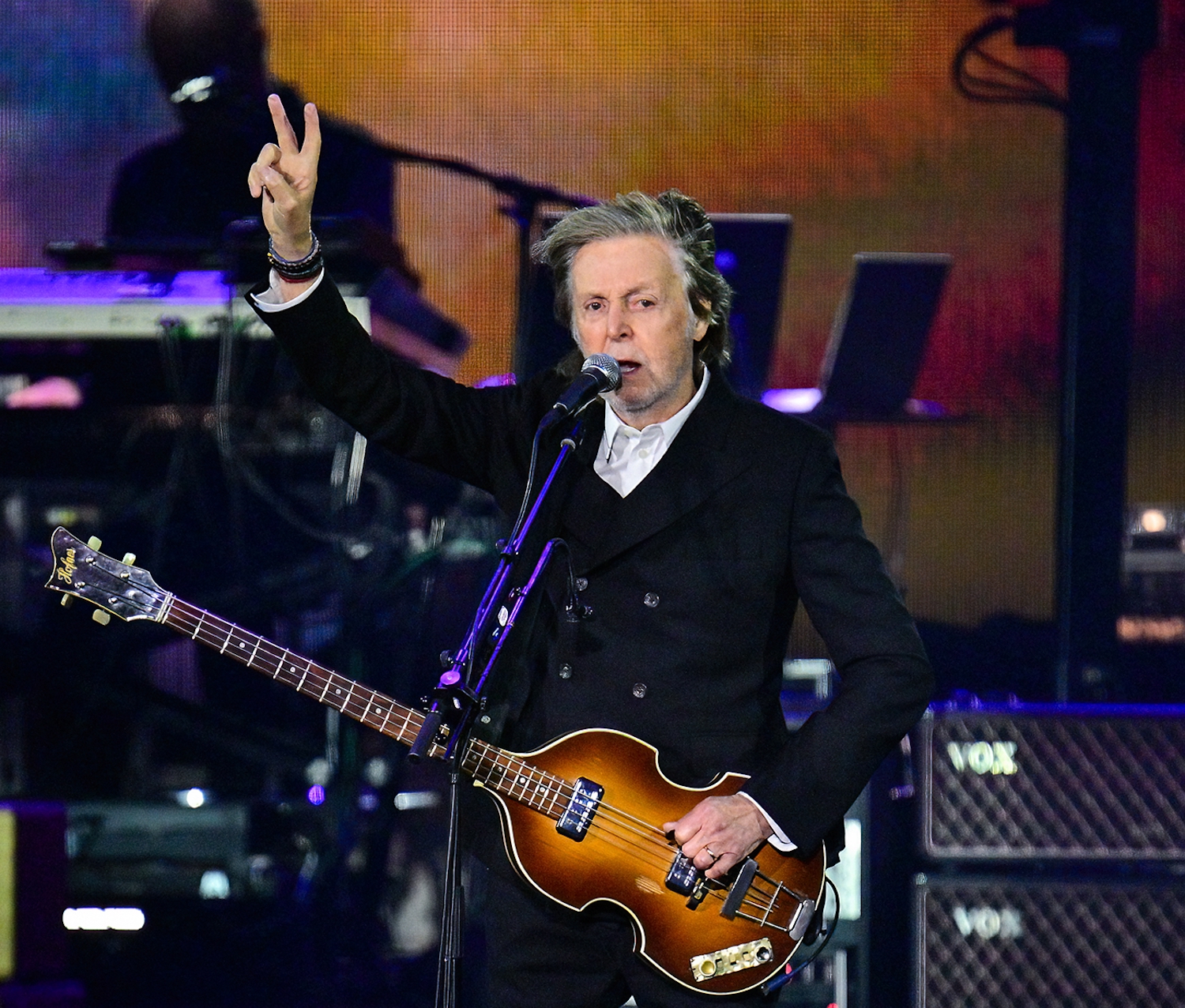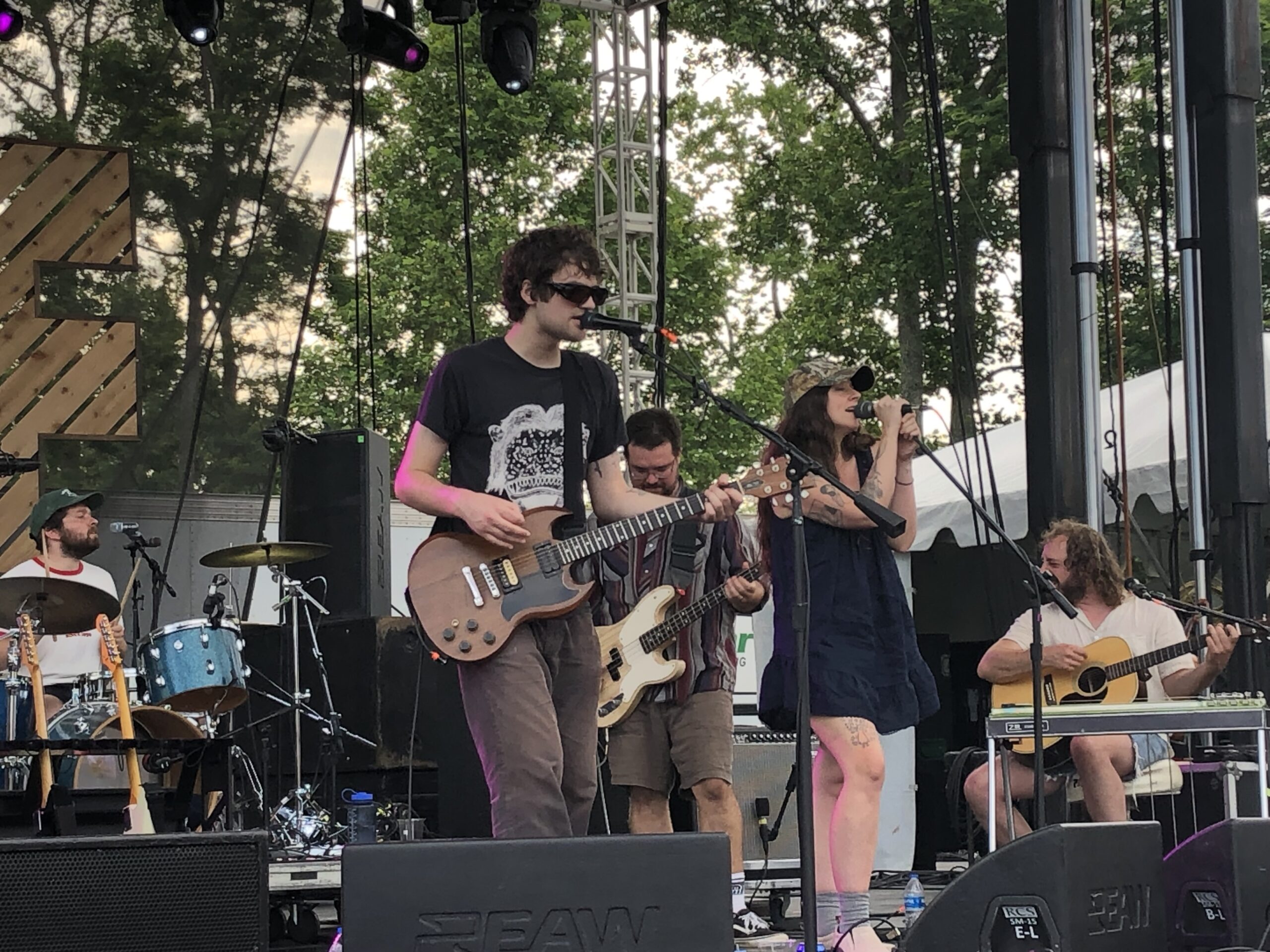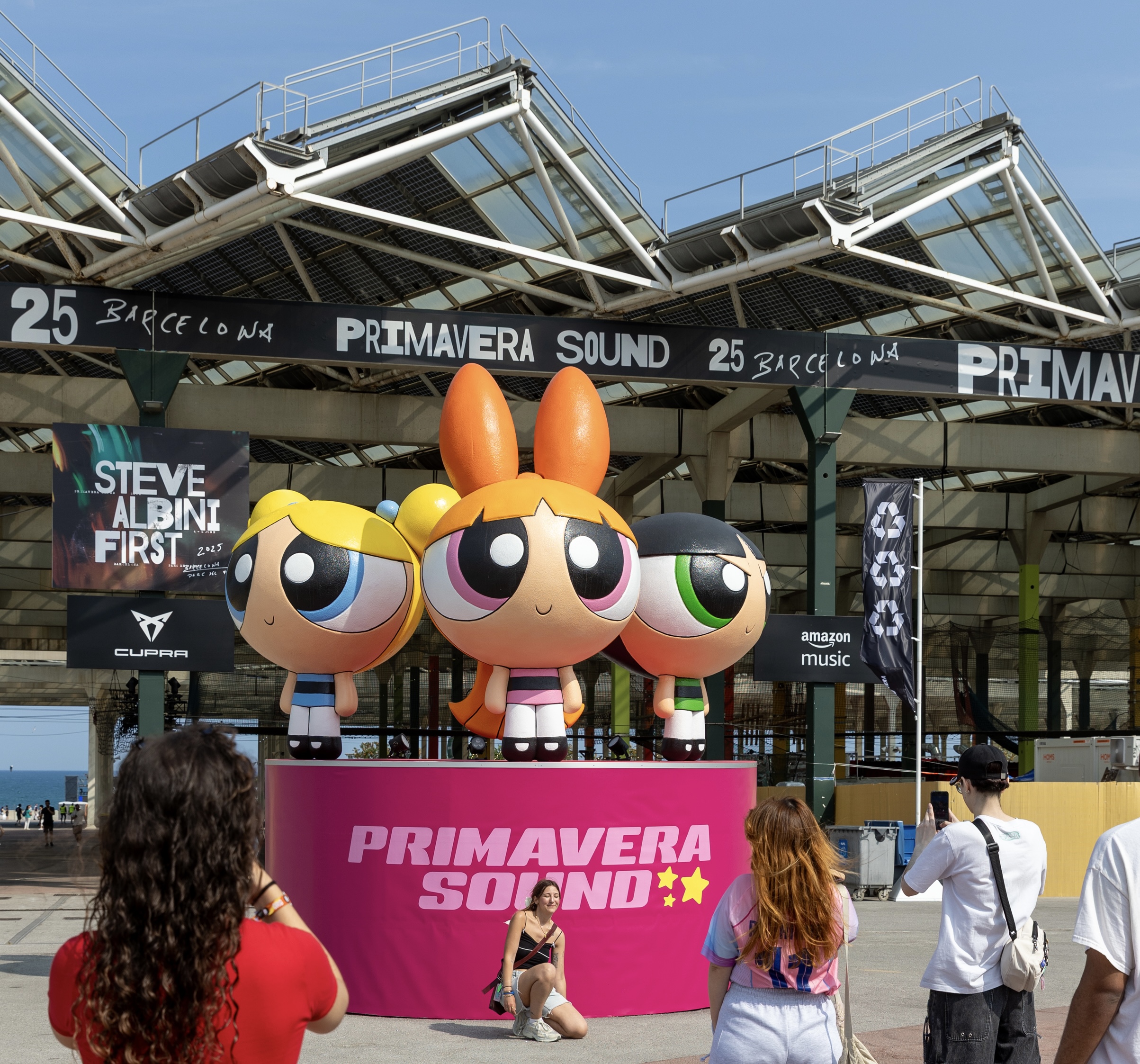It's funny how one review can fuck up the game.
A week or two ago, we'd use this space to go deep on the substance and style of Cindy Lee's time-warping, mind-bending double album Diamond Jubilee. Maybe we can do it a few months from now when the chatter dies down and it comes time to consider our year-end lists. But for now, we're strictly in "what we talk about when we talk about" mode about an album that is not available on streaming and likely never will be, aside from a two-hour YouTube with no track breaks. The closest thing I've heard to a true mainstream crossover is a friend telling me that they heard a SiriusXM DJ talk about Cindy Lee "before they played their fourth MGMT song that hour." And yet, here we are, sussing out whether the magnum opus of Patrick Flegel's drag alter ego is a shift of just vibes or perhaps an entire paradigm, a herald of a bold new future for music writing that looks a lot like its recent past.
I apologize for making assumptions about the likely reader of this piece, but to back things up, on April 12, Pitchfork awarded Diamond Jubilee a 9.1 Best New Music, the highest score given by the publication since the perfect 10 for Fiona Apple's Fetch The Bolt Cutters in 2020. That alone is notable, but not inherently important. Nobody is writing this kind of piece if Waxahatchee or Mannequin Pussy got their scores nudged a bit higher to reflect their likely year-end placement; we didn't see anybody going big-picture on the Weather Station or Floating Points or Sudan Archives, all ascendent artists who are technically "indie" and surely had a material benefit from their sterling scores. They are at a higher echelon than they were in 2021 or 2022, but you can't chalk this up to one review. As for Cindy Lee, at about 9:15PM PDT on April 11, I was able to acquire two tickets to their upcoming gig in San Diego, which had been on sale for over two months. Had I waited 12 more hours, I would have been too late. There is only one possible explanation, which is the sort of Funeral- or You Forgot It In People-style game-changing review that most people thought was impossible in 2024.
Of course, I'd expect such a phenomenon in Chicago or New York or Los Angeles, cities with a robust population of people who engage with music in some sort of semi-professional fashion. This is not the case in San Diego, a city that cool bands often avoid in favor of Orange County and one with large swaths that, at any given time, resemble Los Angeles from 10 years prior. Most of my IRL San Diego friends with whom I discuss music are the type of people who may have read sites like this one in college and have gradually opted out of the narrative in the time since — children, jobs, marriages, general aging, things like that, but also a creeping (if not entirely justified sense) that their favorite publications have dumped them for a loose confederation of pop stan armies. A reductive view for sure, but I guess it does save them a lot of time. Maybe once in a while, they'll text me asking what I think about an indie rock album that's making the rounds, big stuff like Wednesday or Alvvays.
Pretty much all of them asked me if I was going to the Cindy Lee show and, in hopes of taking my tickets off my hands, tried to gauge whether my wife and I were wavering on our commitment to spending a Friday night out past 10PM (at face value, the cost of two tickets was $5 less than the suggested donation for Diamond Jubilee). A friend of mine was taken by her Pitchfork-reading partner to see Hotline TNT at the same venue a few weeks back, but they acted too late on this one. "I'll check it out on Spotify," she said, without irony.Had we all been able to get in, I think the last time my friend group of 30- to 45-year-old washed indie guys and gals went out this hard in full force was when the Built To Spill/Afghan Whigs co-headliner came to town.
Given this demographic, I suppose it's fitting then that we're talking about an album whose aesthetics draw from such a wide range of pop history — girl groups, the Velvet Underground, oddball psych-pop, orchestral funk — but mostly reminds me of 2011. I'm talking about the eerie noir-pop of Dirty Beaches, the unwholesome reveries of Ariel Pink circa Before Today, the redlining Spector-isms of Dum Dum Girls and Vivian Girls and Crocodiles, plain old Girls, and, of course, Women, the short-lived, dearly departed post-punk project that Flegel had fronted until their infamously acrimonious rupture. "Hauntological," "hypnagogic," things of that nature.
We rely on reader subscriptions to deliver articles like the one you're reading. Become a member and help support independent media!
After spending about a week with Diamond Jubilee following its surprise release, I felt that I had its future pretty well mapped out. I had ingested it in 30-minute chunks, because really, I have no idea how some of y'all have two consecutive hours blocked out for listening to this in its entirety (or legit events like Cowboy Carter or The Tortured Poets Department: The Anthology or WE STILL DON'T TRUST YOU). This felt like a sound aesthetic decision as well, because the Cindy Lee album lacked the cinematic sweep of true sitdown affairs like Godspeed! You Black Emperor or a latter day Swans double-LP. Nor did it have a clear Side A/Side B split like Hurry Up We're Dreaming. It was simply hit after hit, without much of an arc, like the DJ Sabrina The Teenage DJ album from last year — immersive, even incapacitating if you give yourself to it fully, but also more like a Grand Theft Auto radio station that's always playing bangers no matter long you take between listens. That certainly held sway with people like myself and fellow old heads who could say "the Women Extended Universe" with a straight face, but the whole thing seemed too niche, too unwieldy and, of course, too weird to really get much traction outside of that peer group.
But I should've sensed that something was in the air. On April 8, The Baffler published Dance Dance Revolution?, a righteous jeremiad by Hubert Adjei-Kontoh that went scorched-earth on the unquestioned, self-congratulatory reflex of critics projecting political import on music that either hasn't earned it or even sought it out in the first place. In Adjei-Kontoh's view, it might have been the result of intellectual laziness, a poor grasp of history, clout chasing, or, most likely, a cynical and very sad recognition that ascribing revolutionary power to a SAULT album is really the closest most people think we can get to praxis. He was talking specifically about this phenomenon in electronic music, but it's familiar to anyone who's followed music writing over the past seven years or so.
The next day, group DMs were passing screenshots of a print review in Bookforum, an impassioned critique of Lauren Oyler's No Judgments, as if the writeup itself was a leaked copy of Kid A in 2000; it was probably the most thorough evisceration of any artist with actual social media credibility in the past decade that wasn't written by Oyler herself. This wasn't the equivalent of Marvel or Måneskin getting roasted. Rarely have we seen a takedown this surgical and severe when both the critic and the artist are on a similar level. It was legitimately exciting, even cathartic to read these things, not just because they expressed ideas that I agreed with, but the ensuing dialog seemed to confirm that criticism could…if not matter…still have a substantial impact after a year where some of the most popular and profitable publications in existence were getting stripped for parts.
For the sort of people who deeply care about online music criticism, Pitchfork's Cindy Lee review was like the trash can through Sal's Pizzeria or the soda that hit Ron Artest as he lay prostrate on the scorer's table — the tension and dissension had been escalating for months, if not years, and this was the spark to set it all off.
The timing could scarcely be better for Diamond Jubilee, arriving smack dab in the middle of the Cowboy Carter and The Tortured Poets Department rollouts. These are two albums which, objectively speaking, should be a blast to write about for both their musical and even sociopolitical potential. These aren't just the two biggest pop stars on earth; depending on who you ask, Joe Biden might be lobbying Beyoncé and/or Taylor Swift right this moment for endorsements that could legitimately save democracy as we know it. And you can't accuse either of phoning it in or playing it safe. Cowboy Carter is the sorta-kinda result of an eight-year grudge about the CMA Awards, with a personnel list that deeply tickles someone like myself who was jamming The Black Album and the Stills' Logic Will Break Your Heart in equal measure back in 2003. I haven't heard TTPD yet, but based on vibes, its closest thematic analog is The Wall or something. And yet, even as both are putting up astronomical numbers in our streaming "deadball era" and receiving varying degrees of breathless critical acclaim, I can't help but feel like a fatigue has started to set in — that with Beyonce actively working to complete a trilogy and Taylor as prolific as ever, that there's no end in sight to their hegemony, a reflection of the entertainment industry's inexorable march towards consolidation.
The fact that Diamond Jubilee was released on Cindy Lee's own imprint rather than Jagjaguwar, their refusal to do interviews, and the absence of a vinyl purchase option (let alone a dozen color variants) probably shouldn't make a difference in how I hear the mesmerizing funk of "Dracula" or the gritty glam of "Glitz" or the sock-hop slow dance of "Wild One." Isn't this anti-marketing a more targeted form of marketing? It might seem that way in the current climate, as the roaring praise for Diamond Jubilee isn't just an endorsement of Cindy Lee. It's also been taken up as a vote of no confidence for the paradoxical past decade of music journalism — one that's tried to satisfy the broadest possible constituency and mostly just left everyone equally pissed off.
Cindy Lee has been a longtime favorite of standard-bearing blogs Gorilla vs. Bear and Passion Of The Weiss, and based on nearly 20 years of friendship with the latter's rap-focused namesake Jeff Weiss, I know it takes a lot for him to throw his weight behind an indie rock album. The august Aquarium Drunkard described Diamond Jubilee as "a throwback to a different, weirder, cooler, better era in independent music" — a time when something "that eschewed the long and laborious album rollout" might have not been the norm but "wasn't so tragically uncommon." It's not surprising that Diamond Jubilee resonates with some of the most respected and successful long-running blogs, even beyond its sound; while so many general interest publications have folded, the aforementioned have thrived with a more tailored approach to coverage that reflects their idiosyncratic tastes and aversion to applying a 24/7-style politics or sports coverage to music.
But as someone who has, let's just say, exhaustively analyzed the blog-rock era, I couldn't help but notice how much of the sentiment surrounding Diamond Jubilee could be summarized by the following: "It's still possible for a band to get heard, given enough talent and perseverance, without a PR agency or a label. Indie rock has received a much-needed kick in the pants, and we have the rare chance to decide what a band sounds like of our own accord before any agency cooks up and disseminates an opinion for us. Damn, maybe this is how it's supposed to work!"
You might remember this as the kicker in Pitchfork's 9.0 review of Clap Your Hands Say Yeah's self-titled debut (but I sorta hope you don't; sometimes I wish I Remembered Less Guys). Yet, even during that undeniably different era (coincidentally, Aquarium Drunkard, POTW and GvsB all began in 2005), your mileage may vary about whether it was weirder, cooler or better. Whoever your mascot might be for that time — Animal Collective, Sufjan Stevens, Deerhunter, M.I.A., Arcade Fire — the vast majority were still backed by PR teams, managers, and esteemed indie labels. And the optimism borne of Clap Your Hands Say Yeah's meteoric rise was almost snuffed out upon the immediate revelation that there isn't a new Clap Your Hands Say Yeah happening every day. By the end, we were lucky to get a Tapes n Tapes or Annuals for our troubles (to be clear, we were lucky, those records were great).
Objectively speaking, it's easier than ever to find truly unsigned hype on SoundCloud or TikTok or Twitter in 2024 than it was on the equivalents from 2004; what's changed is that music publications are no longer the midwife to plum festival slots and sold-out tours at 1,000-cap rooms across the country. I'll make the argument that the closest thing we have to that kind of power broker isn't an actual publication, but the message boards of Rate Your Music or Album Of The Year; here is where you can see an artist come out of literally nowhere to getting rave reviews that actually translate into real-time popularity (i.e., Panchiko or glass beach).
Contrary to Aquarium Drunkard's assessment, Cindy Lee is not an artifact that crash landed to Earth. Diamond Jubilee is Cindy Lee's seventh album since 2012, though 2020's What's Tonight To Eternity? was the first to get any true burn online, eventually getting longlisted for the Polaris Prize. There was live footage from their previous shows circulating on Twitter, but not the kind I remember from the era when obscure and unseasoned bands would get thrust onto stages far too big for them at the moment. This would not be SALEM at the Fader Fort or Wavves at Primavera. Even if this was 2011, Cindy Lee would not turn into Hipster Runoff gossip fodder after a festival meltdown.
I'm long familiar with the basics of Cindy Lee's aesthetic — the beehive wig, the spangly dress, the ambience that requires music writers to either namedrop Blue Velvet or Twin Peaks. A lot of these signifiers overshadow something that's fairly obvious from Diamond Jubilee, but really the first thing you notice in a live setting - Flegel is an amazing guitar player, fluid, melodic, even a little pyrotechnic, most of the time sounding like Marc Ribot soloing with an ice pick. They chewed gum the entire time, with a severe look on their face that reminds me how Women ended with a fistfight on stage. The crowd went wild for that shit. Aside from the occasional solo, Flegel performed the entirety of their set to backing tracks commandeered by their colleagues in the still-underappreciated Freak Heat Waves, who often sound to me like Madchester tracks being heard from a locked bathroom (as my friend commented, "They should be wearing bucket hats").
But I haven't quite grasped the Cindy Lee persona, which made the only piece of stage banter I caught stand out: "I feel like a caged fucking animal." In lieu of giving interviews or posting on social media (though Freak Heat Waves' Instagram account screenshotted the Diamond Jubilee review with the caption "it's officially a good record"), is this the closest thing any of us would ever get on Flegel's commentary on their sudden, second burst of minor indie stardom being taken as a "feel-good indie rock story"? Do they feel good about it?
To give Flegel the benefit of the doubt, Soda Bar is one of the most poorly designed venues I've ever been to — an actual bar runs through the middle of the floor, ending only a few feet from the stage. All of the saddest attempts at moshpits I've seen in San Diego happen here. People complain about how many cell phones are in the air during sets, but since the stage is elevated by maybe six inches, it's impossible to see if you're shorter than 5'8"; the only way to catch what's actually happening on stage really might be to record it and watch later. Then again, Flegel hung back towards the soundboard during the opening acts, waited outside with a cigarette and didn't appear to be interrupted by one punisher the whole time.
From the scant entries I see on Setlist.fm, it appears that Cindy Lee is playing the same exact set in each city - 10 songs (11 if they're including the instrumental intro), no encore. Their set began almost immediately after Freak Heat Waves' ended. A three-bill show on a Friday night that began at 8:30 ended about two hours later. By the time my Lyft dropped me off back home, it wasn't even 11PM yet. The consensus I got from the crowd was they thought it was fucking awesome.
I can't tell whether the intention from Flegel was get me the fuck out of here as soon as humanly possible. I probably won't ever know, for as someone texted me afterwards, "Someone said this is their last tour as Cindy Lee?" This cuts against the impulse my peers and I have been indulging over the past two weeks, to speculate on the future of Cindy Lee and also what it might mean for us, people who have some kind of investment in the power of music journalism to push back against what often feels inevitable. Will Cindy Lee start getting festival bookings? A vinyl reissue for Diamond Jubilee? Shortlist for the Polaris Prize? Would a full-band rendering of Diamond Jubilee negate its uncanny ambience? These were all things that I spent the aughts considering for bands who experienced similarly sudden indie fame, and…well, look where that got us. Diamond Jubilee is an album trapped in the past, but Cindy Lee has no interest in repeating it.






